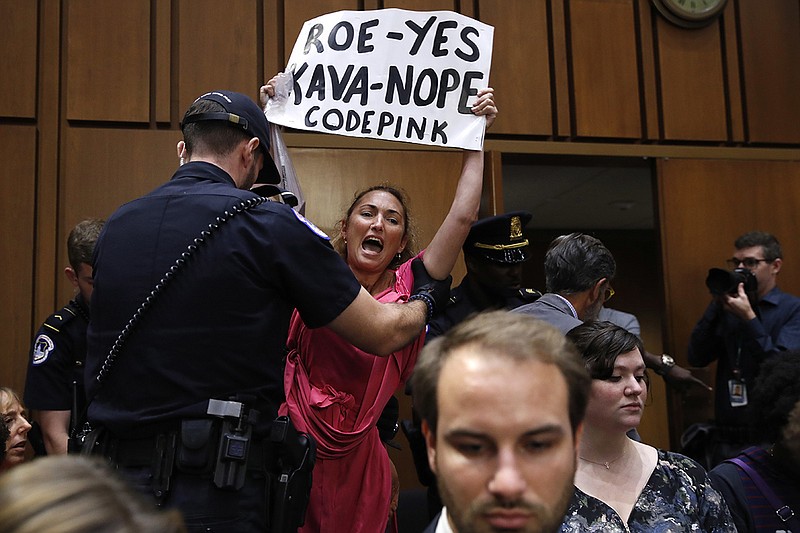In recent editions of the Chattanooga Times Free Press, news briefs recounted convictions or charges of murder for two men in the death of fetuses.
One man, in Tennessee, was sentenced in Knoxville to 50 years in prison for the shooting death of a pregnant woman and her fetus. The other man, in Arizona, was wanted in Phoenix for murder charges in the death of his estranged wife, her fetus and her male renter, and also was sought in the possible abduction of their two sons.
Why, a reader wanted to know, can individuals be charged in the deaths of fetuses but abortion - the deliberate termination of a pregnancy - is legal?
It's a good question with a fairly simple answer. The right for a woman to choose an abortion - in the 1973 Roe v. Wade case with which many are familiar - was found by the United States Supreme Court to be protected under privacy rights granted by the Due Process Clause of the 14th Amendment to the Constitution. However, fetal homicide laws - laws regarding fetuses killed by violent acts against pregnant women - are established in state legislatures and vary from state to state.
For those of us with pro-life leanings, the Supreme Court abortion ruling looks more hypocritical each year as the viability of infants at younger ages increases, due to medical advances, and nearly four out of five states have adopted fetal homicide laws.
For those who favor the choice of abortion, the increasing number of fetal homicide laws must seem really galling and hypocritical, especially in states where the Roe v. Wade decision is more popular.
To the reader's question, though, both Tennessee and Arizona have laws that allow charges to be brought upon the death of a fetus at any stage of its development.
In Tennessee, state law was last amended in 2012 to specify "that the victim of an assaultive offense or a homicide includes a human embryo or fetus at any stage of gestation in utero, when any such term refers to the victim of any act made criminal by the provisions governing such offenses." The law, in 2012 or before, also updated language about victims to define "another," "individuals" and "another person" to include a human embryo or fetus as any stage of development.
In Arizona, in 2013, the state legislature updated its laws regarding negligent homicide, manslaughter, and first- and second-degree murder to include an unborn child. That same year, the state also changed its statutes to specify that a defendant sentenced to death or life imprisonment shall not be released until the completion of 35 years if the murdered person was an unborn child. In addition, the law was rewritten to state that for purposes of punishment, an unborn child shall be treated like a minor under 12 years of age.
At least 38 states, according to the National Conference of State Legislatures, have fetal homicide laws that define the fetus as a person deserving of rights and protection. In at least 29 of those 38 states, laws similar to those in Tennessee and Arizona apply fetal homicide laws to the earliest stage of pregnancy, variously described as "any stage of gestation/development," "conception," "fertilization" or "post-fertilization."
At least eight states that do not have fetal homicide laws have penalty-enhancement laws regarding crimes against pregnant women. The laws do not create a separate charge in the loss of a fetus but do consider the loss of, or harm to, a fetus in relation to the pregnant women or her pregnancy. As with the fetal homicide laws, the penalty-enhancement laws vary from state to state.
In Wyoming, for instance, a person is only judged guilty of assault and battery if they knowingly or recklessly cause bodily harm to a woman they know is pregnant. In Maine, a person is guilty only of elevated aggravated assault on a pregnant person if the perpetrator intentionally or knowingly causes serious bodily injury to a person they know or have reason to know is pregnant. Both laws evidently include death of the fetus.
While 38 states do recognize some type of fetal homicide law, at least one United States law recognizes a fetus in any stage of development as a legal victim if the fetus is injured or killed in the commission of any of more than 60 federal crimes of violence. The Unborn Victims of Violence Act of 2004 applies to crimes committed on federal properties, against certain federal officials and employees, and by members of the military. It also covers certain crimes defined by federal statute wherever they occur, no matter who commits them, such as certain crimes of terrorism.
The legislation, which excepts abortion, nevertheless was opposed by most groups favoring abortion because the Roe v. Wade Supreme Court decision as much as said a fetus is not a "person" under the 14th Amendment, but if it were it would have a constitutional right to life.
What do 38 states know that the 1973 Supreme Court didn't know? The advance of medicine may push that 45-year-old finding to be re-examined. We don't hold out hope at this point that abortion will become a thing of the past but that some day the viability of a fetus may make killing one at a much earlier point similar to fetal homicide.
